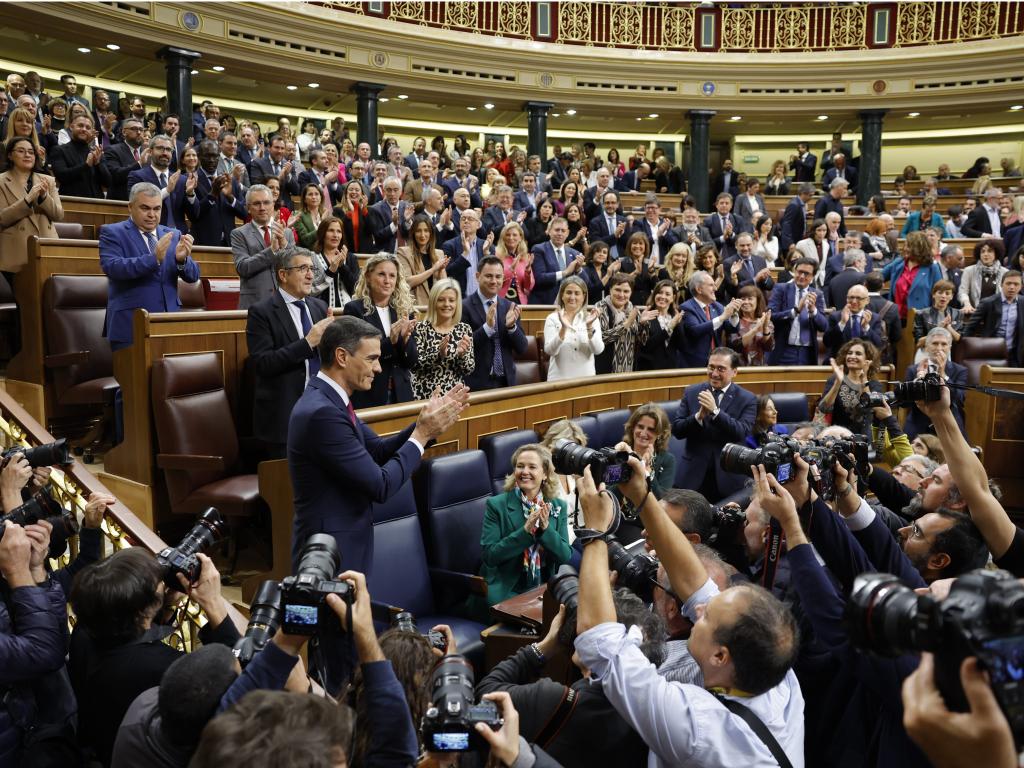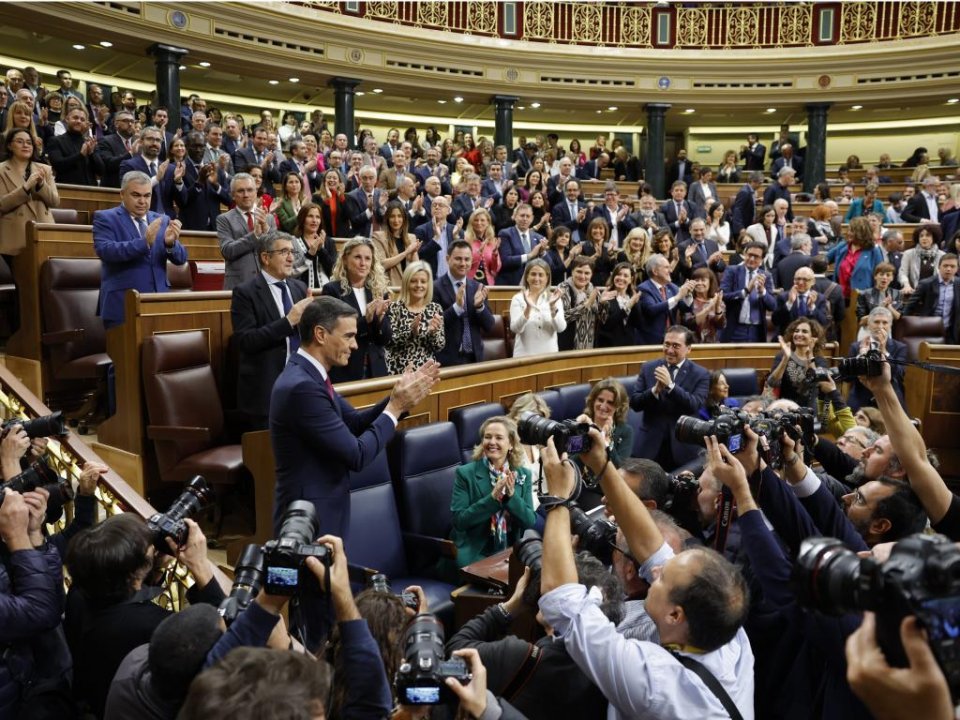Spain’s acting Prime Minister Pedro Sánchez defended his controversial amnesty deal for Catalonia’s pro-independence politicians and activists in the Spanish Congress on Wednesday, as part of the debate before the PSOE socialist leader seeks the endorsement of parliament to form a new government. ALSO READ: Amnesty bill registered in Spanish Congress – full details.
Ahead of the opening session, police had blocked off access around the Congress building to prevent protesters from possibly surrounding it – although the number of protesters who’d gathered in the nearby streets and the Plaza Neptune totalled less than 1,000 during the morning. Spanish media reported that 1,600 police officers had been deployed to ensure that the investiture debate and vote runs normally, following 13 days of protests by the right-wing and far-right parties’ supporters against the proposed amnesty. ALSO READ: Feijóo vows to continue protests against amnesty ‘until there are new elections’.
‘We are going to promote a climate of living together in harmony and forgiveness,’ Sánchez told MPs in reference to his act of grace. ‘In Catalonia and other regions there are citizens who believe that they would be better going their own way. This government believes that a united Spain is a better Spain.’
Sánchez chided the leading opposition People’s Party (PP) for its hard-line stance against the Catalan pro-independence parties, which he said only contributed to pushing more Catalans into wanting independence when the PP were in government under their previous leader, Mariano Rajoy. He boasted that his pardoning of imprisoned Catalan leaders and activists in 2021 had led to reducing tensions in Catalonia. [Click here for all our reports on Catalan Independence. Also see below – Background to Catalan political conflict.]
‘Dialogue, a generous attitude and forgiveness has worked. That is our proposal, to continue with the position for the next four years,’ he said to applause from his party amid some jeers from his opponents.
Spain’s judges have heavily criticised the proposed amnesty, calling it an intrusion of the legislative branch into the separation of powers. The European Union is also reviewing the proposed amnesty.
‘For those who had peacefully protested, I want to show them my respect and acknowledgement,’ Sánchez said, before defending the constitutionality of the support he has garnered.
Sánchez spent most of his initial speech presenting his plan for government. He compared his policies to expand women’s rights and adapt to climate change to what he called the reactionary agenda of a PP party that has entered into alliances with the far-right Vox party in several regional governments.
‘The only effective barrier to the policies of the far right is our coalition government,’ Sánchez said.
To be officially reinstated as PM after the inconclusive July general election, Sánchez needs to win support from at least 176 MPs within the 350-seat Spanish Congress. If he were to lose Thursday’s vote, he would have a second chance on Saturday to win more ‘yes’ than ‘no’ votes. If he fails again, Spain will automatically be forced to hold new elections, which would be in mid-January.
Sánchez is expected to be voted in as PM in the first round’s vote on Thursday. He has the support of the 121 MPs in his own PSOE party, the 31 MPs of Sumar – with whom he will form a coalition government – and he also first won the support of the six MPs of Basque party EH Bildu. Over the past weeks, he then went on to secure the support of the Basque Nationalist (EAJ-PNV) Party’s 5 MPs, the backing of the Catalan pro-indpendence parties ERC and JxCat (both with seven seats each), as well as the support of the sole representatives from the Galician Nationalist party (BNG) and the Canary Islands Coalition. This will make a total of 179 MPs in the 350-seat chamber.
The formation of a new government in Spain should end a period of political uncertainty since inconclusive national elections on 23 July left a highly fractured parliament. The PP was the most voted party in the summer’s elections, but it failed to form a government when it tried in September. ALSO READ: King Felipe instructs Pedro Sánchez to try and form a government.
Besides the amnesty, Sánchez had to make more concessions to the ERC and JxCat parties.
The PSOE agreed with the ERC to relieve millions of euros of debt for the region and to cede it partial control of Rodalies, the commuter train services currently run from Madrid. Sánchez’s party then bent to pressure from Carles Puigdemont’s JxCat party to let Catalonia keep more of its tax revenues, and most contentiously, open talks on the possibility of debating a referendum for independence for Catalonia, but within the limits of the Spanish Constitution. ALSO READ: The PSOE and Junts sign a pact that will guarantee investiture of Pedro Sánchez.
Sánchez has defended his deals saying that they will help to continue to normalise the political situation in Catalonia. The pro-independence parties have lost power in recent elections, while Sánchez’s Catalan Socialists (PSC) have surged in the region.
The deal also means that Puigdemont’s JxCat party has for the first time in nearly a decade dropped its posture of trying to destabilise the Spanish state and, at least for now, could guarantee thats Sánchez remains in power by agreeing to vote with the government on key bills. ALSO READ: Pedro Sánchez faces backlash and tough legislature ahead due to Catalan deal.
Background to Catalan political conflict
Nine Catalan politicians and activists were jailed for between 9-13 years by the Spanish Supreme Court in October 2019, convicted of sedition and misuse of public funds for their role in the 2017 illegal referendum, with the verdicts causing widespread protests across Catalonia. In June 2021, the nine walked free from prison, following pardons granted by the government led by Prime Minister Pedro Sánchez, but they remained banned from holding public office.
Late last year, Spain passed a controversial criminal code reform that downgraded the two charges used against them, abolishing sedition and replacing it with that of aggravated public disorder, and also reducing the penalty for misuse of public funds.
Misuse of public funds can carry prison time of between six months and up to five years if convicted, but disobedience only carries a disqualification from public office.
Carles Puigdemont led the government of Catalonia when it staged the referendum banned by Madrid and the courts, which was followed by a short-lived declaration of independence.

Sign up for the FREE Weekly Newsletter from Spain in English.
Please support Spain in English with a donation.
Click here to get your business activity or services listed on our DIRECTORY.
Click here for further details on how to ADVERTISE with us.


